ADHD Natural Remedies Effectiveness Checker
Effectiveness Summary
Key Takeaways
- Evidence‑based natural options include omega‑3 fatty acids, regular physical activity, and mindfulness meditation.
- Dietary tweaks like reducing sugar and adding protein can sharpen focus for many people.
- Herbal supplements such as ginkgo biloba and zinc show modest benefits but need professional supervision.
- Acupuncture and neurofeedback are promising for some, yet research is still emerging.
- Combine several strategies for the best results and always check with a healthcare provider.
Living with ADHD is a neurodevelopmental condition marked by inattentiveness, hyperactivity, and impulsivity. While stimulant medication works for many, a growing number of families ask, "What can we try besides pills?" This guide walks through the most researched ADHD natural remedies, explains how they work, and offers practical steps you can start today.
Understanding the Landscape of Alternative ADHD Care
Before jumping into specific treatments, it helps to know why natural options matter. They often target the same brain pathways as medication-dopamine, norepinephrine, and overall neuronal health-without the same risk of appetite loss, sleep disruption, or cardiovascular side effects. However, “natural” does not automatically mean “safe,” so each approach should be weighed for evidence, dosage, and personal health profile.
Omega‑3 Fatty Acids: The Brain‑Boosting Fish Oil
One of the most consistently supported supplements is omega‑3 fatty acids. EPA and DHA are key components of neuronal membranes, influencing neurotransmitter signaling. A 2023 meta‑analysis of 13 double‑blind trials found that children taking 1,200mg of combined EPA/DHA per day improved attention scores by an average of 8% compared with placebo.
Practical tip: Aim for a high‑quality fish oil supplement delivering at least 500mg EPA and 300mg DHA daily. If you prefer food, incorporate fatty fish (salmon, mackerel) 2‑3 times a week, or add ground flaxseed to smoothies.
Mindfulness Meditation: Training the Attention Muscle
Mindfulness meditation teaches the brain to notice distractions without reacting. A 2022 randomized controlled study with 84 adolescents showed that an 8‑week mindfulness program reduced inattentive symptoms by 10% and improved self‑regulation scores.
Getting started is simple: begin with 5minutes of guided breathing each morning, using free apps or YouTube videos. Gradually extend to 15‑20minutes, adding body‑scan exercises on days when focus feels especially scattered.
Physical Exercise: Moving Toward Better Focus
Regular aerobic activity spikes dopamine and norepinephrine levels, mirroring the effects of stimulant drugs. Research from the University of Exeter (2024) tracked 150 school‑aged children; those engaging in 30minutes of moderate‑intensity exercise (jogging, cycling, or swimming) at least five days a week demonstrated a 12% improvement in classroom attention compared to a sedentary control group.
Fit it into daily life by encouraging brisk walks after school, short dance breaks during homework, or weekend sports clubs. Consistency beats intensity-short daily bouts are more effective than occasional marathon sessions.
Dietary Modifications: Fueling the Brain Right
While the "sugar‑ADHD" myth is overstated, several dietary factors can influence symptom severity.
- Protein‑rich breakfasts (eggs, Greek yogurt, nuts) stabilize blood glucose and support neurotransmitter synthesis.
- Eliminating potential allergens such as gluten or dairy may help children with sensitivities; a 2021 elimination trial showed a 15% drop in hyperactivity scores for those who removed these foods.
- Iron and zinc deficiencies correlate with poorer attention. Blood tests revealing low ferritin (<30ng/mL) or zinc (<70µg/dL) often improve after corrective supplementation.
Start by logging meals for a week to spot patterns, then add a balanced protein source at each meal and consider a multivitamin if labs show deficiencies.
Herbal Supplements: Ginkgo Biloba & Other Botanicals
Ginkgo biloba is thought to enhance cerebral blood flow. A small 2020 pilot with 40 adolescents reported a modest 6% improvement in attention after 120mg daily for eight weeks, though larger trials are pending.
Other botanicals gaining interest include:
- Rhodiola rosea: may reduce stress‑related irritability.
- Passionflower: calming effects useful for evening routines.
Always purchase standardized extracts and discuss dosage with a pharmacist, especially because herbs can interact with prescribed medication.
Acupuncture: Needle‑Based Neuromodulation
Acupuncture aims to rebalance the body's energy (Qi) and has shown promise in reducing hyperactivity. A 2022 systematic review of 7 RCTs (total n=352) concluded that acupuncture combined with conventional therapy lowered hyperactivity scores by an average of 9% compared with therapy alone.
If you’re curious, seek a licensed practitioner experienced in pediatric care. Typical regimens involve weekly sessions for 6‑8 weeks, focusing on points such as LI4 (Hegu) and SP6 (Sanyinjiao).
Neurofeedback: Training Brain Waves
Neurofeedback provides real‑time visual or auditory cues as the brain attempts to reach target wave patterns (usually increasing beta activity and decreasing theta). A 2023 multi‑site trial involving 210 participants reported a 14% reduction in inattention after 30 sessions over three months.
While cost can be a barrier (average £150 per session), some clinics offer bundled packages. Look for certified providers who use EEG‑based protocols rather than unvalidated “brain‑training” games.
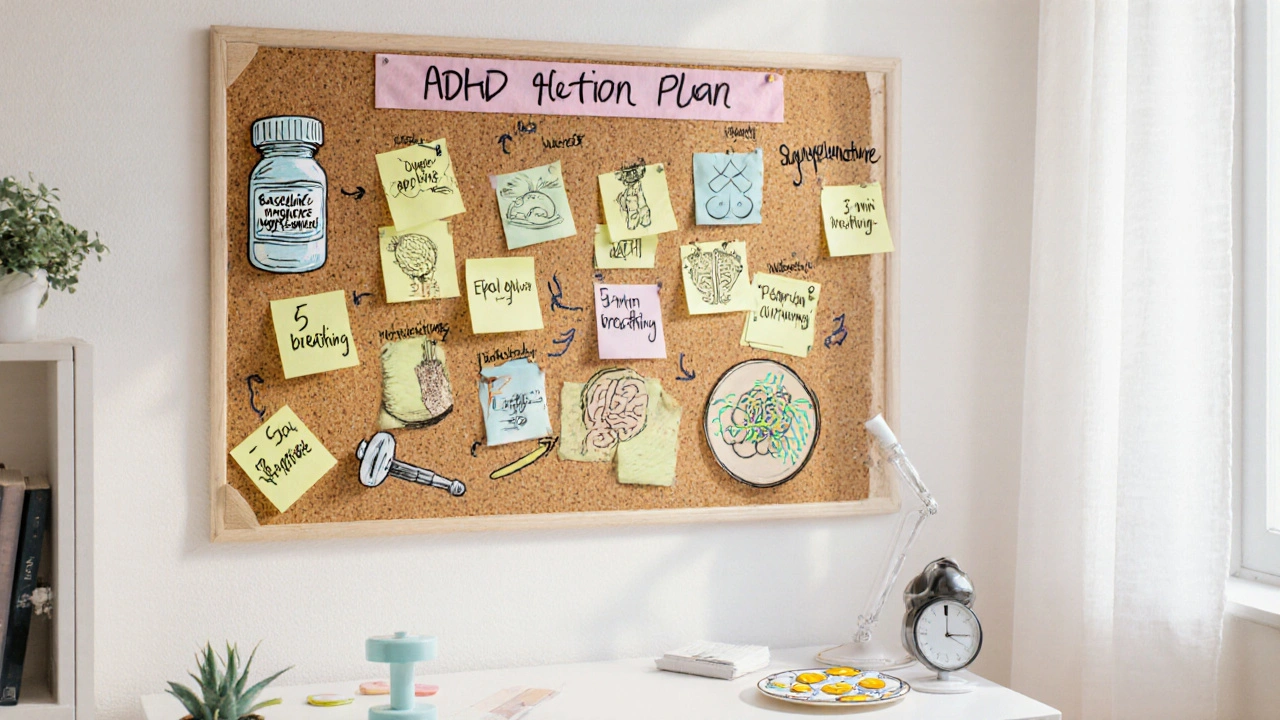
Cognitive Behavioral Therapy (CBT): Skill‑Based Coping
Although not a "natural" supplement, cognitive behavioral therapy is a non‑pharmacological cornerstone. CBT teaches organizational strategies, self‑monitoring, and emotional regulation. A 2021 UK cohort study showed that children receiving weekly CBT alongside school support improved academic performance by an average of 0.4grade levels.
Parents can start by accessing NHS‑approved CBT programs or hiring a licensed therapist for 8‑12 weekly sessions.
Comparing the Most Popular Natural Options
| Remedy | Evidence Level | Typical Dose / Frequency | Possible Side Effects |
|---|---|---|---|
| Omega‑3 fatty acids | Strong (meta‑analysis) | 1,200mg EPA/DHA daily | Minor GI upset, fishy aftertaste |
| Mindfulness meditation | Moderate (RCTs) | 5‑20min daily | None (rare: transient frustration) |
| Regular aerobic exercise | Strong (observational & RCT) | 30min, 5×/week | Injury risk if unsupervised |
| Ginkgo biloba | Weak‑moderate (small pilots) | 120mg daily | Headache, allergic skin rash |
| Acupuncture | Moderate (systematic review) | Weekly 30‑min sessions, 6‑8 weeks | Bruising, mild soreness |
| Neurofeedback | Emerging (multi‑site trial) | 30min sessions, 2‑3×/week for 3months | Fatigue, temporary headache |
| CBT | Strong (controlled studies) | 1‑hr weekly, 8‑12 weeks | None (emotional discomfort during exposure) |
Putting It All Together: A Personalised Action Plan
Because ADHD is highly individual, the best strategy blends several modalities. Here’s a step‑by‑step template you can adapt:
- Baseline check: Get a full medical exam, including iron, zinc, and ferritin labs.
- Start a supplement: If labs are low, begin omega‑3 (1,200mg) and a zinc tablet (15mg) under doctor guidance.
- Build daily movement: Schedule 30minutes of aerobic activity-walk the dog, bike to school, or follow a home cardio video.
- Introduce mindfulness: Use a free 5‑minute guided breathing app each morning for two weeks, then add a 10‑minute evening body scan.
- Assess diet: Add a protein‑rich breakfast, cut sugary drinks, and keep a food‑symptom journal for three weeks.
- Consider one extra therapy: If focus remains shaky, try either acupuncture (weekly) or neurofeedback (if budget allows) for a trial month.
- Track progress: Use a simple rating scale (1‑10) for attention, impulsivity, and mood each week. Adjust doses or activities based on trends.
Remember, changes take time. Most families notice measurable improvement after 8‑12 weeks of consistent effort.
Potential Pitfalls & How to Avoid Them
- Over‑supplementation: High doses of omega‑3 can thin blood; keep under 3g/day unless a physician says otherwise.
- Self‑diagnosing allergies: Removing entire food groups without testing may cause nutrient gaps. Work with a dietitian.
- Skipping professional input: Some herbs interact with ADHD meds (e.g., ginseng may raise blood pressure). Always disclose supplements to your GP.
- Inconsistent practice: Benefits fade if meditation or exercise lapses. Set reminders or pair the habit with an existing routine.
Frequently Asked Questions
Can natural remedies replace medication for ADHD?
For many, supplements and lifestyle changes can lower the required medication dose, but they rarely eliminate it entirely. Work with a doctor to monitor symptom changes and adjust treatment safely.
Is fish oil safe for children?
Yes, when dosed appropriately (usually 1g‑1.2g EPA/DHA per day). Choose a product tested for mercury and other contaminants. Discuss any bleeding disorders with a physician first.
How long does it take to see results from mindfulness?
Most studies report noticeable benefits after 4‑8 weeks of daily practice. Consistency beats session length-short daily sessions often outperform occasional longer ones.
Are there any risks with acupuncture for ADHD?
When performed by a licensed practitioner, acupuncture is low‑risk. Minor bruising or soreness is the most common side‑effect. Always verify the practitioner's credentials and discuss any clotting disorders before starting.
Which remedy is best for adults with ADHD?
Adults often benefit most from omega‑3, structured exercise, and mindfulness, combined with CBT for executive‑function coaching. Herbs like ginkgo may help memory, but should be added under medical supervision.
Do I need a special diet if I take supplements?
Supplements work best on a balanced diet rich in whole foods, protein, and healthy fats. Avoid excessive processed sugars and refined carbs, which can counteract the calming effects of many natural therapies.
How can I monitor progress without expensive testing?
Use simple rating scales (e.g., 1‑10) for attention, impulsivity, and mood each day, or track specific tasks like homework completion time. Apps that log mood or focus can also provide visual trends.
Natural remedies aren’t a magic bullet, but they can form a solid foundation for a calmer, more focused life. Pair the right supplement with daily movement, mindful breathing, and structured therapy, and you’ll likely see steady improvement without the roller‑coaster side‑effects of some medications.
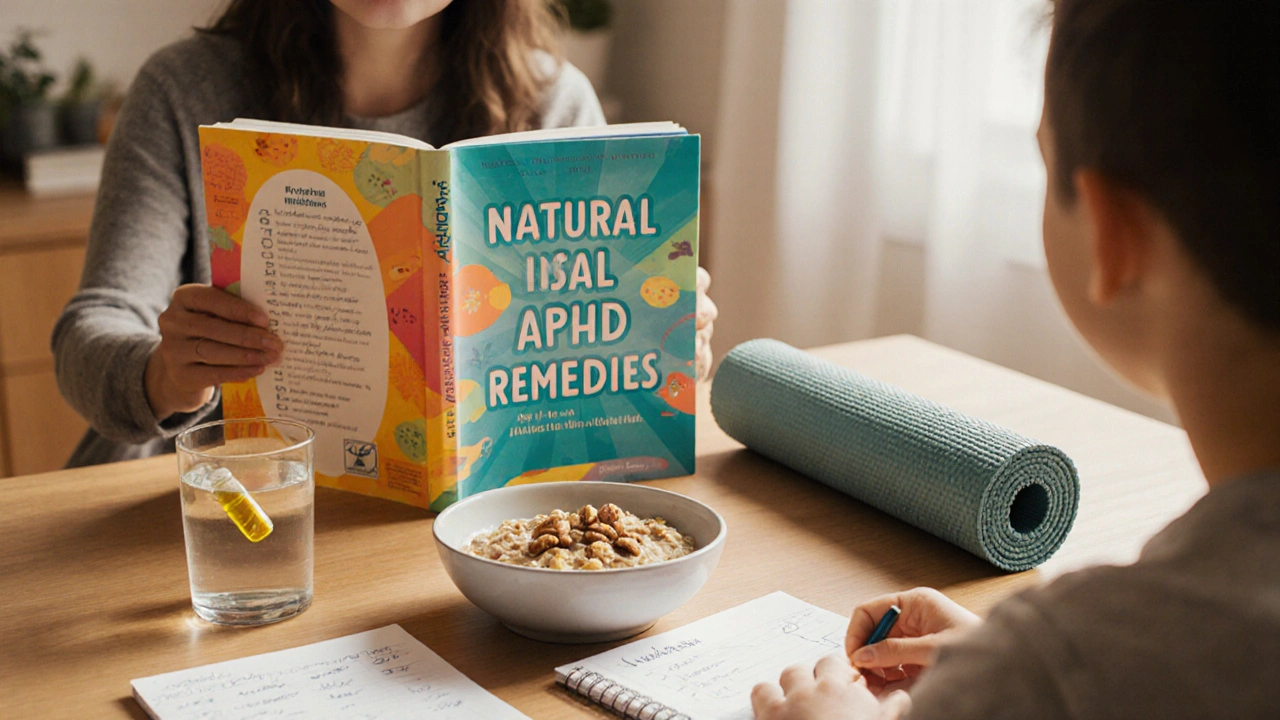
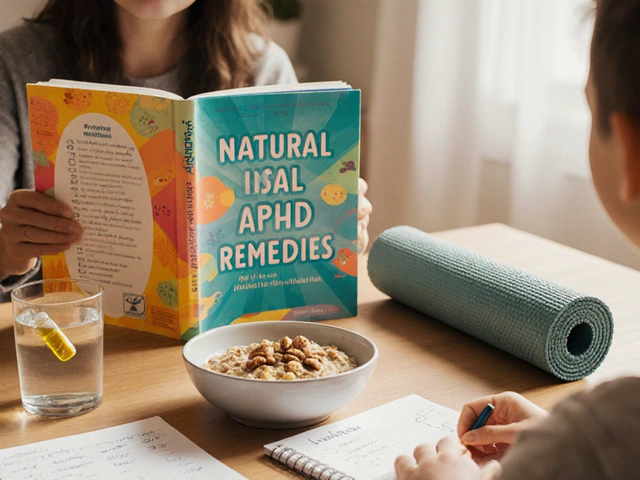
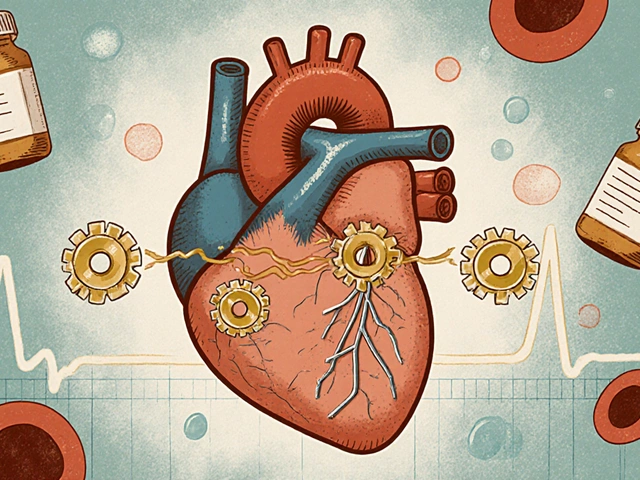
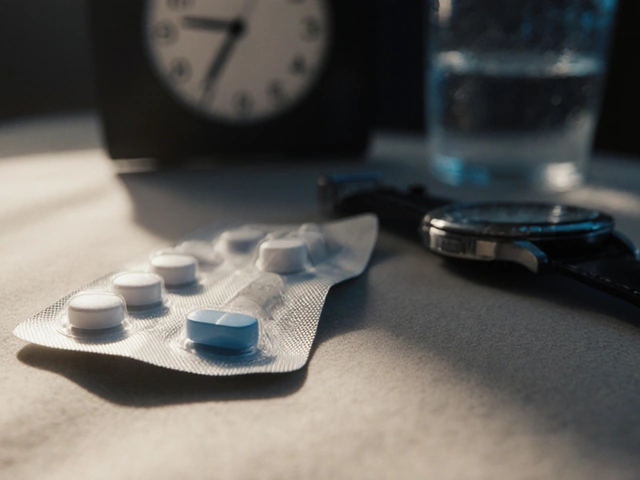

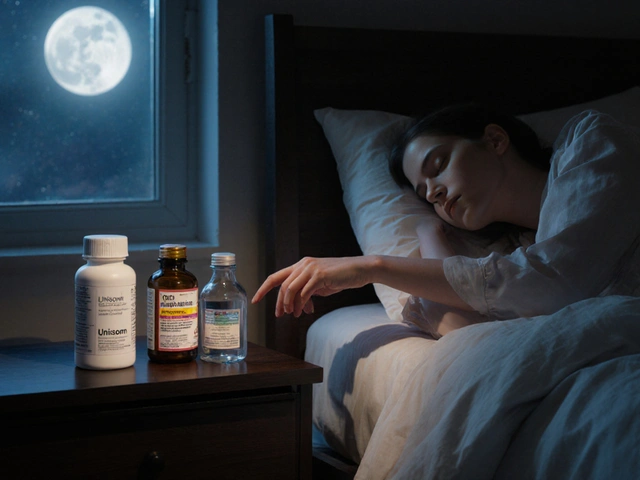
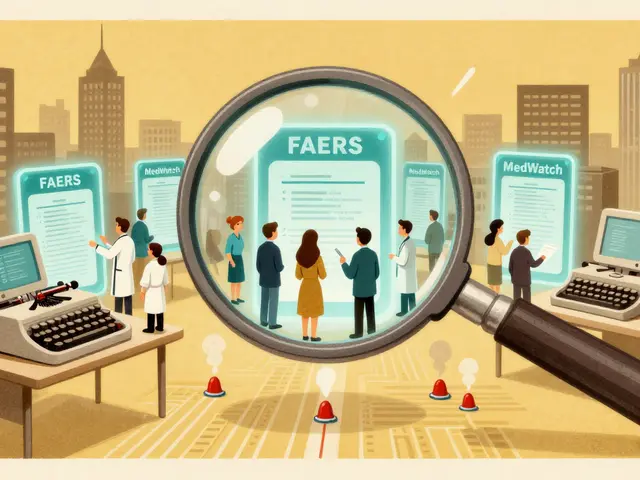
Write a comment
Your email address will be restricted to us